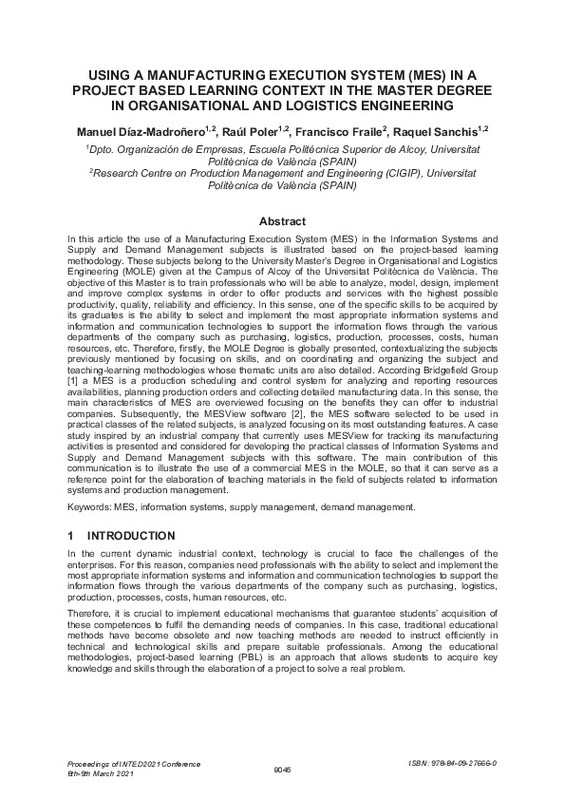JavaScript is disabled for your browser. Some features of this site may not work without it.
Buscar en RiuNet
Listar
Mi cuenta
Estadísticas
Ayuda RiuNet
Admin. UPV
Using a Manufacturing Execution System (MES) in a Project Based Learning Context in the Master Degree in Organisational and Logistics Engineering
Mostrar el registro sencillo del ítem
Ficheros en el ítem
| dc.contributor.author | Díaz-Madroñero Boluda, Francisco Manuel
|
es_ES |
| dc.contributor.author | Poler, R.
|
es_ES |
| dc.contributor.author | Fraile Gil, Francisco
|
es_ES |
| dc.contributor.author | Sanchis, R.
|
es_ES |
| dc.date.accessioned | 2021-11-05T14:07:27Z | |
| dc.date.available | 2021-11-05T14:07:27Z | |
| dc.date.issued | 2021 | es_ES |
| dc.identifier.uri | http://hdl.handle.net/10251/176285 | |
| dc.description.abstract | [EN] In this article the use of a Manufacturing Execution System (MES) in the Information Systems and Supply and Demand Management subjects is illustrated based on the project-based learning methodology. These subjects belong to the University Master¿s Degree in Organisational and Logistics Engineering (MOLE) given at the Campus of Alcoy of the Universitat Politècnica de València. The objective of this Master is to train professionals who will be able to analyze, model, design, implement and improve complex systems in order to offer products and services with the highest possible productivity, quality, reliability and efficiency. In this sense, one of the specific skills to be acquired by its graduates is the ability to select and implement the most appropriate information systems and information and communication technologies to support the information flows through the various departments of the company such as purchasing, logistics, production, processes, costs, human resources, etc. Therefore, firstly, the MOLE Degree is globally presented, contextualizing the subjects previously mentioned by focusing on skills, and on coordinating and organizing the subject and teaching-learning methodologies whose thematic units are also detailed. According Bridgefield Group [1] a MES is a production scheduling and control system for analyzing and reporting resources availabilities, planning production orders and collecting detailed manufacturing data. In this sense, the main characteristics of MES are overviewed focusing on the benefits they can offer to industrial companies. Subsequently, the MESView software [2], the MES software selected to be used in practical classes of the related subjects, is analyzed focusing on its most outstanding features. A case study inspired by an industrial company that currently uses MESView for tracking its manufacturing activities is presented and considered for developing the practical classes of Information Systems and Supply and Demand Management subjects with this software. The main contribution of this communication is to illustrate the use of a commercial MES in the MOLE, so that it can serve as a reference point for the elaboration of teaching materials in the field of subjects related to information systems and production management. | es_ES |
| dc.description.sponsorship | This article has been supported by Universitat Politècnica de València, particularly by the Vice-rectorate for Digital Resources and Documentation (Vicerrectorado de Recursos Digitales y Documentación) and Vice-Rectorate for Studies, Quality and Accreditation (Vicerrectorado de Estudios, Calidad y Acreditación) under the Call for Learning + Teaching (Convocatoria A+D2019: Aprendizaje + Docencia. Proyectos de Innovación y Mejora Educativa) and Project Code: A157. The authors would like to acknowledge the support of the Institute of Educational Sciences (Instituto de Ciencias de la Educación), the Evaluation and Monitoring Commission for Educational Innovation and Improvement Projects (Comisión de Evaluación y Seguimiento de Proyectos de Innovación y Mejora Educativa (CESPIME) and Escuela Politécnica Superior de Alcoy. | es_ES |
| dc.language | Inglés | es_ES |
| dc.publisher | International Association of Technology, Education and Development | es_ES |
| dc.relation | / | es_ES |
| dc.relation.ispartof | INTED proceedings (Online) | es_ES |
| dc.rights | Reserva de todos los derechos | es_ES |
| dc.subject | MES | es_ES |
| dc.subject | Information systems | es_ES |
| dc.subject | Supply management | es_ES |
| dc.subject | Demand management | es_ES |
| dc.subject.classification | ORGANIZACION DE EMPRESAS | es_ES |
| dc.title | Using a Manufacturing Execution System (MES) in a Project Based Learning Context in the Master Degree in Organisational and Logistics Engineering | es_ES |
| dc.type | Artículo | es_ES |
| dc.type | Comunicación en congreso | es_ES |
| dc.identifier.doi | 10.21125/inted.2021.1893 | es_ES |
| dc.relation.projectID | info:eu-repo/grantAgreement/UPV//PIME%2F19-20%2F157//Incorporación del aprendizaje basado en proyectos en las titulaciones de grado de la Escuela Politécnica Superior​/ | es_ES |
| dc.rights.accessRights | Abierto | es_ES |
| dc.contributor.affiliation | Universitat Politècnica de València. Departamento de Organización de Empresas - Departament d'Organització d'Empreses | es_ES |
| dc.description.bibliographicCitation | Díaz-Madroñero Boluda, FM.; Poler, R.; Fraile Gil, F.; Sanchis, R. (2021). Using a Manufacturing Execution System (MES) in a Project Based Learning Context in the Master Degree in Organisational and Logistics Engineering. INTED proceedings (Online). 9045-9055. https://doi.org/10.21125/inted.2021.1893 | es_ES |
| dc.description.accrualMethod | S | es_ES |
| dc.relation.conferencename | 15th International Technology, Education and Development Conference (INTED 2021) | es_ES |
| dc.relation.conferencedate | Marzo 08-09,2021 | es_ES |
| dc.relation.conferenceplace | Online | es_ES |
| dc.relation.publisherversion | https://doi.org/10.21125/inted.2021.1893 | es_ES |
| dc.description.upvformatpinicio | 9045 | es_ES |
| dc.description.upvformatpfin | 9055 | es_ES |
| dc.type.version | info:eu-repo/semantics/publishedVersion | es_ES |
| dc.identifier.eissn | 2340-1079 | es_ES |
| dc.relation.pasarela | S\430869 | es_ES |
| dc.contributor.funder | Universitat Politècnica de València | es_ES |








